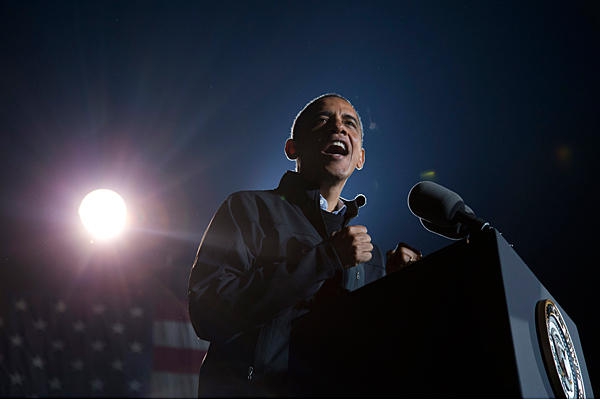
It didn't take long for the specter of Iran to rise up and hover over the preparations for President�Barack Obama's second term.
It might not be obvious that this is what happened last week, when fighting erupted in and around the Gaza Strip, but Iran figured in every element of the crisis.
Iran provided Hamas with the long-range missiles that made its confrontation with Israel so serious, and it egged on both Hamas' leaders and the more radical Palestinian splinter groups that actually launched many of the rockets that precipitated Israel's military response.
Iran also was undoubtedly pleased to see Israel tied down with a crisis on its western border, diverting attention from its concerns about Iran's nuclear program to the east. Iran likely was just as pleased to see attention diverted from the brutality being committed by its ally in Syria, where hundreds of its opposition foes were killed while the world was distracted.
Moreover, Israeli Prime Minister Benjamin Netanyahu may well have agreed to an Egyptian and American cease-fire plan mostly to preserve military flexibility and international goodwill for his efforts to halt Iran's nuclear program.
"Iranian soft power in the Middle East tends to peak during times of tumult and carnage, which it can attribute to U.S. or to Israeli actions," says Karim Sadjadpour, an Iran analyst at the Carnegie Endowment for International Peace.
So, you might ask, what does all this have to do with the arc of President Obama's second term?
Simple. It shows how hard it will be for the president to ignore the many problems Iran creates to focus on the rest of what he'd like to get done in the four years ahead.
In the three weeks since the election, it's become easier to define the agenda President Obama would like to pursue.
At home, he will try to accomplish three big tasks: fix the country's fiscal mess, launch an overhaul of the immigration system and start (modestly) trying to do more about climate change.
Fixing the budget happens to be essential for America's strength abroad as well as at home. "The first year still needs to be largely concerned with the budget," says Richard Haass, president of the Council on Foreign Relations, who is finishing a book on how America's foreign policy should start by solidifying the home front. "Putting this country on a sustainable trajectory economically is a bigger priority than Iran or Syria or anything else."
Overseas, the Obama priorities are ending the war in Afghanistan and pivoting American policy more toward Asia, the region that represents the economic and security challenges of the future.
But Iran has the ability to disrupt much of that. Every president since Jimmy Carter has found that Tehran's mullahs have the ability to disrupt best-laid plans and frustrate the desire to break away from the morass of the Middle East.
Indeed, it's telling that Mr. Obama had to interrupt his postelection trip to Asia to deal with the mess in Gaza. There could be no more apt metaphor for how hard it will be to execute a pivot toward Asia when Iran and the Islamists it inspires have the ability to create crises elsewhere.
Moreover, Iran's leaders have every reason to keep the Palestinian pot stirring, which will compel Mr. Obama to invest time and energy trying to get something going on the moribund Palestinian-Israeli diplomatic front. Iranians also will continue to do whatever is necessary to preserve their lone Arab ally, Syria's bloodstained Bashar al-Assad, pushing Mr. Obama closer to a decision on whether to recognize and help arm the Syrian opposition.
Broadly speaking, Iran benefits from a boiling pot; indeed, it recruits its allies from amid the turmoil it creates. "There's a symbiotic relationship between Arab popular anger and misery and Iranian influence in the Middle East," says Mr. Sadjadpour. "The former fuels the latter, the latter fuels the former."
Nor do America's moves toward greater energy independence and away from dependence on Middle East oil give Mr. Obama the luxury of washing his hands of such problems.
Regardless of America's own direct need for Middle Eastern oil, the world still looks to the U.S. as the military power best able to ensure the stable and steady flow of that oil to the world economy.
As Anthony Cordesman, an analyst at the Center for Strategic and International Studies notes, the only alternative to the U.S. as guarantor of security in the region is China, which isn't a choice anyone in the West should relish.
All of that, of course, comes before even considering the biggest problem of all, which is Iran's nuclear program. President Obama's dreams for a second term will be of other things, but his nightmares may well be about Iran.
The Iran Project is not responsible for the content of quoted articles.











